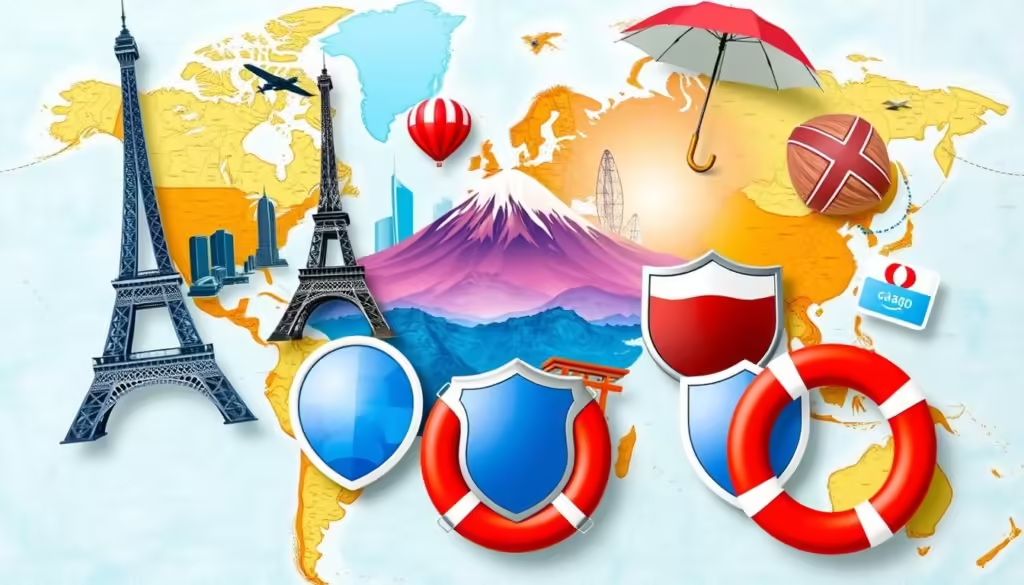Do You Need Travel Insurance? Everything You Need to Know
November 5, 2024 | by m33559844@gmail.com

Are you getting ready for your next big trip? It’s easy to forget about the unexpected things that can happen. Imagine booking your dream vacation, only to have it canceled or facing a medical emergency. These situations can be scary, making you wonder: do I really need travel insurance?
Travel insurance is like a safety net for your trip. It helps protect your money and health from unexpected problems. It covers things like last-minute changes and even tragic events. This is especially important for trips abroad, where medical help might be hard to find.
Travel usually costs between 4% and 10% of your trip’s cost. This is a small price to pay compared to the potential losses from canceling or interrupting your trip12. The truth is, unexpected things can happen anytime. Without insurance, you could face big financial losses.
As you read on, you’ll learn more about travel . You’ll see why it’s so important and how it can give you peace of mind. With travel , you can focus on making memories that will last a lifetime.
Key Takeaways
- Travel insurance costs typically range from 4% to 10% of your trip’s price.
- It offers financial protection against unexpected cancellations and emergencies.
- Emergency medical evacuation can reach costs of over $200,000.
- Policies often exclude coverage for pandemics, necessitating careful review.
- Most travel insurance plans are more affordable for children under 18.
What is Travel Insurance?
Travel is key for anyone planning a trip. It covers unexpected events that can ruin your travel plans. It includes trip cancellations, medical emergencies, lost luggage, and unexpected delays. Knowing what travel is helps protect your money from unexpected costs.
Most policies cost between 4% to 10% of your trip’s total cost. This helps limit financial losses if something goes wrong3.
Some policies cover trip cancellations, reimbursing your pre-paid expenses if something unexpected happens3. Emergency medical evacuation coverage is also important. It helps move you to the nearest good hospital3.
Accidental death and dismemberment coverage is crucial too. It pays a set amount if you get seriously hurt during your trip3.
Some homeowners insurance might cover lost or stolen items during trips. But, this coverage is usually limited3. “Cancel For Any Reason” (CFAR) policies offer a percentage of your travel costs back if you cancel for any reason. This makes them a flexible choice4.
Comprehensive travel covers delays, cancellations due to illness, lost luggage, and some emergency medical costs. It ensures you’re well-protected4.
In conclusion, knowing what travel is helps you plan better. With different types of coverage available, it’s important to match your needs with your trip details. This way, you can choose the right travel for you.
Do I Need Travel Insurance?
Traveling is exciting but comes with risks. Knowing these risks helps you decide if you need travel . A study shows about 30% of Americans buy travel before a trip5. Risks include accidents, sickness, natural disasters, and lost items, which can ruin your trip.
Understanding the Risks of Traveling
Every trip has its dangers, especially in new places. Medical issues can happen abroad, making you wonder if you need insurance. Without it, medical bills can be very high, especially in tourist spots5.
Only 10% of travelers have insurance for medical evacuations5. This shows a big need for better preparation.
Factors to Consider When Deciding
Several things affect your decision to buy travel . The cost of your trip is key, as insurance is 5% to 6% of the total6. For a $5,000 trip, insurance costs about $2286.
Personal health and your travel provider’s reliability also matter. These factors should guide your choice.
Benefits of Travel Insurance
Travel is key to a better travel experience. It protects you financially from unexpected events. This way, you can enjoy your trip without worrying about the unexpected.
Financial Protection Against Losses
One major benefit of travel is the financial safety it offers. It helps cover costs if your trip is cancelled, delayed, or cut short. For example, if a hurricane closes the airport, you won’t lose money on your trip7.
If something tragic happens before you leave, like a family member’s death, insurance can help. It can cover the cost of cancelling your trip7.
Medical Coverage While Abroad
Medical emergencies can happen anytime, anywhere. That’s why medical coverage while abroad is so important. Travel acts as a backup, covering costs that your regular health might not.
Plans like Allianz’s OneTrip Basic cover up to $10,000 for medical emergencies. The OneTrip Prime policy goes even further, covering up to $25,0008.
Peace of Mind During Your Travels
Having peace of mind during travels is crucial. Travel ensures that unexpected problems won’t spoil your trip. It covers lost luggage and the costs of waiting for it to arrive.
Allianz plans even help with the costs of buying essentials during delays. This can really help reduce stress8. Plus, it can cover the cost of emergency helicopter transport, showing how vital insurance is for adventures abroad7.
Types of Travel Insurance
The travel market has many types to fit different needs. Knowing these options helps travelers choose wisely. The main types are trip cancellation insurance, medical insurance, and coverage for lost or stolen baggage.
Trip Cancellation Insurance
Trip cancellation insurance helps if you can’t take your trip due to illness or disasters. It’s key for those worried about losing money if plans change9. It makes sure you don’t lose out on nonrefundable costs.
Medical Insurance and Emergency Evacuations
Medical insurance covers health emergencies while traveling, saving you from big medical bills. Most domestic health plans don’t cover costs abroad9. Emergency evacuation coverage is also vital, covering up to $50,000 for transport back home if needed9.
Baggage Loss and Theft Coverage
Baggage loss coverage helps if your items get lost, stolen, or damaged. Baggage delay insurance helps with essentials while waiting for your bags10. This coverage makes your trip stress-free, letting you enjoy your journey more.

What Does Travel Insurance Cover?
It’s important to know what travel covers. Policies vary, and understanding common scenarios helps you choose the right one.
Common Coverage Scenarios
Travel insurance helps in many situations. It covers things like:
- Trip cancellations due to unexpected events, like illness or natural disasters.
- Medical emergencies while traveling, ensuring you get the care you need.
- Lost or delayed luggage, helping you get back essential items.
For example, trip cancellation insurance can cover up to 100% of your prepaid, nonrefundable travel costs11. Travel health is crucial for international trips, covering big medical bills that can add up fast outside the U.S12. Emergency medical evacuations can cost over $10,000 and go up to $300,00011. Knowing these scenarios helps you prepare for any unexpected events on your trip.
Exclusions You Should Know
Travel is a safety net, but knowing what’s not covered is key. Common exclusions include:
- Cancellations due to pre-existing conditions or fear of travel.
- High-risk activities, which might need extra coverage.
- Some reasons for trip cancellations might not be covered by standard policies.
Understanding these exclusions can avoid surprises. Premiums for travel depend on age and destination, affecting coverage12. Always read the fine print to make sure the coverage fits your travel plans and risks.
How to Choose Travel Insurance
Finding the right travel can be overwhelming. There are many options to choose from. It’s important to pick one that fits your needs and compare policies well for full coverage.
Comparing Policies and Coverage Options
When comparing policies, look at what each offers. Good policies cover trip cancellations, medical issues, and emergency evacuations. But, not all policies are the same.
For example, some policies cover pre-existing medical conditions without extra cost. This is if you buy the insurance soon after booking, usually within 14 to 21 days13.
Cost is also key; trip insurance should cost between 3-8% of your trip price14. For a $4000 trip, expect to pay $130 to $282 for coverage14. Prices vary a lot, so get quotes from different providers to find the best deal.
Reading the Fine Print
Before you buy, read the policy details carefully. It’s important to know what’s not covered, as over 20% of claims are denied for pre-existing conditions14. Check if your policy covers trip interruptions, especially for serious reasons like illness or a family member’s death13.
Also, look for “cancel for any reason” clauses. These can refund a lot of your costs if you need to cancel14.

To choose wisely, think about how each policy meets your needs, especially for expensive trips. Finding the right balance between coverage and cost is key, especially for risky activities like extreme sports15.
| Insurance Aspect | Description | Notes |
|---|---|---|
| Policy Cost | Generally 3-8% of trip price | For a $4000 trip, expect $130-$28214 |
| Pre-existing Conditions | Coverage included if purchased within 14-21 days | Important for older travelers13 |
| Cancel for Any Reason | Refunds 75-80% of trip cost if canceled | Check policy for availability14 |
| Claims Denied | Over 20% of claims are rejected due to pre-existing conditions | Understand policy limitations14 |
Travel Insurance Cost
Knowing how much travel costs is key for planning your budget. The average cost is between 4% to 10% of your trip’s total cost. For example, a $5,000 trip might cost between $200 and $291 for insurance, depending on the policy16. On average, you’ll pay about 6.87% of your trip’s cost17.
Typical Price Range Based on Trip Cost
costs change based on how long you travel and where you go. For a $1,000 trip, insurance might be around $58. But for a $50,000 trip, it could be up to $2,16816. Here’s a detailed look at average costs for different trip values:
| Trip Cost | Average Percentage | Average Cost |
|---|---|---|
| $1,000 | 7.27% | $72.74 |
| $2,000 | 7.03% | $105.43 |
| $5,000 | 5.28% | $264.20 |
| $10,000 | 6.00% | $599.63 |
| $20,000 | 6.78% | $1,016.56 |
| $50,000 | 8.82% | $4,410.48 |
Factors Influencing Insurance Rates
Several things affect how much travel costs. Your age is a big factor, with younger people paying less. For example, a 60-year-old might pay between $261 and $492 for insurance16. Other factors include the coverage you choose and if you want “cancel for any reason,” which adds about $9416. The number of people traveling also matters, adding $48 for a family of four16.
Best Travel Insurance Providers
Choosing the right travel provider is key to a great trip. Many companies offer policies that fit different needs. Look for providers with good customer reviews and unique features.
Overview of Top Companies
Some companies really stand out. Allianz Global Assistance helps with medical emergencies and trip cancellations. Travel Guard has plans with up to $150,000 for cancellations and $225,000 for interruptions18.
Berkshire Hathaway AdrenalineCare is great for adventure lovers. Generali Premium is known for covering pre-existing conditions18. These options give travelers peace of mind.
What to Look for in a Provider
Look at customer service, how fast they process claims, and coverage options. A good provider is often accredited, like those with A+ ratings from the BBB19. Travel insurance can cost 4% to 10% of your trip, depending on what you choose18.
Also, check out ‘Cancel for Any Reason’ policies. They offer flexibility and protection against unexpected events.

Alternatives to Travel Insurance
Travelers have several alternatives to travel . They can use coverage through credit cards or self-insure for short trips. Knowing these options helps you choose the best way to protect your travels.
Coverage Through Credit Cards
Many premium credit cards offer travel protections. For instance, the Chase Sapphire Reserve covers up to $1,000,000 for accidents and up to $20,000 for trip cancellations. But, these benefits might not be as full as travel insurance20. It’s important to check your card’s terms to know what’s covered21.
Self-Insuring for Short Trips
Some choose to self-insure for short trips, thinking the risks are lower. This can save money but is risky if unexpected things happen. Without insurance, you could face big costs for medical emergencies or trip issues22.
| Option | Coverage Provided | Considerations |
|---|---|---|
| Coverage Through Credit Cards | Less comprehensive, includes cancellations and delays | Check details and limits, may not cover high-risk activities |
| Self-Insuring | Full personal responsibility | Can save money but risky for unforeseen emergencies |
It’s key to look at these alternatives to travel carefully. This helps you make a smart choice for protecting your travels202122.
Conclusion
Travelers often wonder if they need travel . It offers many benefits, like protection against delays and cancellations. It also helps with big medical costs. In 2021, over 111,000 flights were canceled, showing how travel can be unpredictable. Also, more than 2 million bags were mishandled, causing extra trouble and costs23.
It’s important to think about your own travel plans. The cost of trip interruptions can add up quickly. For example, a medical evacuation from Canada could cost over $20,00024. Having travel can give you peace of mind and save you money.
Travel Packing List: How to Pack Light for Your Next Adventure . Deciding if you need depends on your travel plans. While it might seem like an extra expense, not having it could lead to much bigger costs. So, it’s wise to ask yourself, “do I need travel insurance?” when planning your trip25.
FAQ
Do I need travel insurance for domestic trips?
Yes, travel is good for domestic trips too. It helps with unexpected cancellations, medical emergencies, or other issues that might ruin your plans.
What does travel insurance typically cover?
Travel usually covers trip cancellations, medical emergencies, lost or stolen bags, emergency evacuations, and travel delays. But, what it covers can vary by policy.
What are the benefits of having travel insurance?
Travel offers financial protection against trip cancellations and medical emergencies. It also gives you peace of mind against unexpected events during your travels.
How do I choose the right travel insurance policy?
To pick the right policy, compare different ones. Look at what they cover, read the fine print, and choose one that fits your travel needs and risks.
How much does travel insurance typically cost?
Travel insurance costs about 4% to 10% of your trip’s total cost. The price depends on how long you’re traveling, where you’re going, your age and health, and the coverage you choose.
Are there alternatives to purchasing travel insurance?
Yes, some credit cards offer travel protections like trip cancellations, delays, and lost luggage. But, this coverage might not be as full as what you get from a travel policy.
What types of travel insurance are available?
There are mainly three types: trip cancellation insurance, medical and emergency evacuation coverage, and coverage for lost or stolen bags. Each type meets different travel needs.
What are the exclusions commonly found in travel insurance policies?
Policies often exclude cancellations due to pre-existing conditions, fear of travel during pandemics, or personal negligence. Always check what’s not covered in your policy.
Who are some of the best travel insurance providers?
Top providers include Allianz Travel, Travel Guard, and World Nomads. Look at their coverage, customer service, and claims process to find the best fit for you.
Source Links
- https://content.naic.org/article/should-you-get-travel-insurance-what-you-should-know-about-protecting-your-trips
- https://www.ricksteves.com/travel-tips/trip-planning/travel-insurance
- https://disb.dc.gov/page/taking-trip-information-about-travel-insurance-you-should-know-you-hit-road
- https://www.nationwide.com/lc/resources/home/articles/what-is-travel-insurance
- https://wwwnc.cdc.gov/travel/page/insurance
- https://www.forbes.com/advisor/travel-insurance/should-you-buy-travel-insurance/
- https://www.nationwide.com/lc/resources/home/articles/reasons-to-buy-travel-insurance
- https://www.nerdwallet.com/article/travel/is-travel-insurance-worth-getting
- https://your.yale.edu/sites/default/files/files/Travel Insurance 101.pdf
- https://www.nerdwallet.com/article/travel/travel-insurance
- https://www.usatoday.com/money/blueprint/travel-insurance/what-does-travel-insurance-cover/
- https://www.investopedia.com/terms/t/travel-insurance.asp
- https://www.aarp.org/travel/travel-tips/safety/info-2019/travel-insurance-tips.html
- https://www.frommers.com/tips/health-and-travel-insurance/travel-insurance-what-you-need-to-know-before-you-buy
- https://www.businessinsider.com/personal-finance/travel-insurance/is-travel-insurance-worth-it
- https://www.forbes.com/advisor/travel-insurance/average-travel-insurance-cost/
- https://www.nerdwallet.com/article/travel/how-much-is-travel-insurance
- https://www.newsweek.com/vault/travel-insurance/best-travel-insurance/
- https://www.insuremytrip.com/
- https://www.businessinsider.com/personal-finance/travel-insurance/travel-insurance-vs-credit-card
- https://travel.state.gov/content/travel/en/international-travel/before-you-go/your-health-abroad/Insurance_Coverage_Overseas.html
- https://www.cnbc.com/2018/06/15/when-you-can-skip-travel-insurance-and-when-you-should-buy-it.html
- https://www.bhtp.com/is-travel-insurance-worth-it/
- https://www.becu.org/blog/do-you-need-travel-insurance
- https://www.melaniemay.com/do-i-need-travel-insurance/
RELATED POSTS
View all



